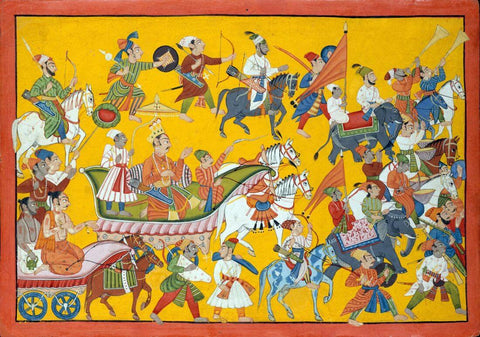In the days of yore, the venerable sage Vasishtha recounted the story of the great King Dasaratha and the events that led to the rise of Rama and his noble allies, all divinely ordained under the guidance of Lord Vishnu.
After Dasaratha’s marriage to Kaushalya, the daughter of the mighty Kosala king, a grand and elaborate ceremony took place in the splendid city of Ayodhya. Ravana, after extending his respects to the newlywed couple, took his leave. Overcome with joy, Dasaratha’s father-in-law gifted him the entire kingdom of Kosala as a token of his love and esteem, for Kaushalya, his only daughter, was the rightful heir to all his wealth. Thus, the rulers of Ayodhya became known as the Kosala kings.
In time, Dasaratha took a second wife, Sumitra, the fair daughter of the Magadha king. Later still, he married Kaikeyi, the beautiful daughter of the Kekaya king. Though his life was filled with wealth, honor, and respect, and though his reign was just and prosperous, a lingering sorrow haunted Dasaratha’s heart—he remained childless, and as the years passed, this gnawing void grew deeper.
One fateful day, the wind god Vayu visited Dasaratha’s court, bearing a message from the mighty Indra, king of the gods. Indra sought Dasaratha’s assistance in a war against the dreaded demons and giants, for Dasaratha was famed throughout the realms for his mastery of weapons and battle strategy. Without hesitation, the righteous king agreed to lend his aid, gathering his mighty army and preparing for battle.

To his surprise, his third wife Kaikeyi, skilled in the arts of war and an archer of great renown, offered to accompany him on this perilous campaign. Dasaratha agreed, and they set forth, waging a long and arduous war against the demon hordes. During one of the fiercest battles, as the king’s forces were nearly overwhelmed and Dasaratha himself exhausted, Kaikeyi, ever steadfast, came to his aid. With her sharp arrows, she scattered the demons, and when a fierce blow from one of the enemy smashed the axle of Dasaratha’s chariot, Kaikeyi leapt from her own, and with her bare hands, held the wheel in place throughout the final, decisive moments of the battle.
After the victory, the gods, filled with gratitude, showered Dasaratha with gifts and honors. As they journeyed home, Dasaratha marveled at Kaikeyi’s strength and asked how she was able to perform such a miraculous feat. With great humility, she recounted how, in her youth, she had once offended the wrathful sage Durvasa. He had cursed her, saying that her hand would turn to iron. When she begged his forgiveness, the sage softened the curse, saying that her hand would become as strong as iron only when she was engaged in protecting her husband in battle. Thus, what was once a curse had turned into a blessing.
Pleased by her devotion and valor, Dasaratha offered Kaikeyi two boons as a reward. But Kaikeyi, bowing low, requested that she be allowed to claim them at a future time. Dasaratha agreed, and they returned to Ayodhya, where they were welcomed with grand celebrations by the people, the court, and fellow kings.
These two boons, Vasishtha concluded with a knowing smile, would one day shape the great epic to come, an Itihasa in which Rama would rise, fulfilling a destiny woven by the gods themselves. And with these words, the sage ended his narration for the day.






